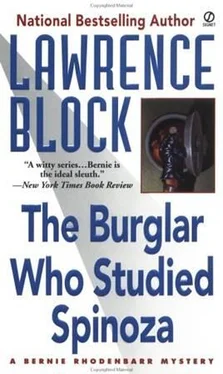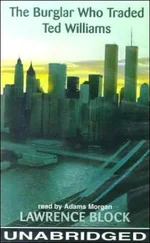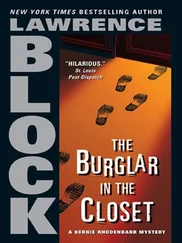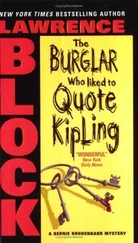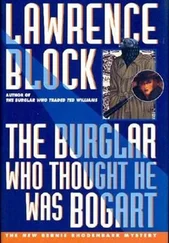Ten minutes later I let myself out and locked the door behind me. I climbed up seven flights of stairs, let myself back into Abel's apartment by the simple expedient of turning the knob, closed and locked the door, took off my trusty Pumas and everything else, set the bedside alarm for seven, and got back into bed.
And couldn't sleep at first. I got up, found a robe in the closet, put it on. It dawned on me that I hadn't eaten enough all day to sustain a canary, so I went into the kitchen and knocked off the rest of the Black Forest cake and finished the quart of milk. Then I went back to bed and slept.
I was up before the alarm. I had a quick shower, found a safety razor and shaved with it. It was strange, living in his apartment, as if I'd slipped into the very life my old friend had lately given up, but I didn't let myself dwell on it. I made a cup of instant coffee, drank it, and got dressed. I put on the dress shoes again and packed the Pumas in the attaché case, along with another of the books I'd been browsing earlier.
Neither the elevator operator nor the doorman gave me a second glance. They had never seen me before, but I was leaving at a civilized hour of the morning, and even in a stuffy old co-op on Riverside Drive there are surely some tenants of either gender who are apt to have the occasional stranger spending the occasional night, and leaving under his or her own power by light of dawn.
Hair Apparent was on Ninth Avenue a few doors north of Twenty-fourth Street, next to a restaurant called Chelsea Commons. It was closed, of course, with a folding steel gate similar to the one I had at Barnegat Books. A padlock secured the gate across the doorway. I stood there in full view of passers-by and used a piece of spring steel to tease the lock until it opened.
Nobody paid any attention. It was broad daylight-and shaping up to be a beautiful day in the bargain. And I was well-dressed and obviously respectable, and to anyone watching I'd have looked as though I were using not a lock-pick but a perfectly legitimate key. Nothing to it, really.
Not much more to the business of unlocking the door. It took a little longer but it wasn't terribly tricky.
Then I opened the door and the burglar alarm went off.
Well, these things happen, in life as in dreams. I'd noted the alarm when I'd dropped in on Marilyn Margate the previous afternoon, and I'd looked around long enough to spot the cut-out switch on the wall near the first chair. I walked into the shop, proceeded directly to the cut-out switch, and silenced the shrill wailing.
No harm done. The neighbors were very likely used to that sort of thing. Business proprietors set off their own alarms all the time when they open up. It's when an alarm goes off in the middle of the night, or sounds for a long time unattended, that people reach for the phone and dial 911. Otherwise they assume it's all business as usual.
Anyway, what sort of idiot would burglarize a beauty shop?
I spent better than half an hour burglarizing this one. When I left, everything was as I had found it, with the sole exception of the burglar alarm, which I didn't reset for fear of setting it off again on my way out. I left the money in the register-just a few rolls of change and a dozen singles. And I left the gun Marilyn had pointed at me; she'd returned it to her employer's drawer, and that's where I let it remain.
I wiped the surfaces I was likely to have touched-rubber gloves didn't go well with my outfit. And I locked up after myself, and drew the window gates shut, and fastened the padlock.
Carolyn's number didn't answer. I started to call Denise, then changed my mind. I walked east on Twenty-third Street and read the plaques on the Chelsea Hotel, which boasted not of pediatricians and podiatrists in residence but writers who'd lived there in the past-Thomas Wolfe, Dylan Thomas. At Seventh Avenue I turned right and walked on downtown. Now and then I would pass a church, the worshipers all fresh-faced and spruced up as if in celebration of the season. A beautiful morning, I told myself. You couldn't ask for a finer day to bury Abel Crowe.
Of course, I reminded myself, we wouldn't actually bury him today. That would have to wait. But, if the service went as I hoped it would, perhaps we could lay my old friend to rest-his spirit if not his body. I had spent a night in his apartment, the apartment in which he'd been struck down and killed, and I couldn't say that I felt the presence of a restless spirit, an unquiet ghost. Then again, I'm not much at feeling presences. Someone who's more sensitive to that sort of thing might have felt Abel's shade close at hand in that living room, pacing the oriental carpet, crying out for vengeance. Just because I'm not aware of those things doesn't mean they don't exist.
I walked down below Fourteenth Street and had a big breakfast at a coffee shop in the Village-eggs, bacon, orange juice, toasted bran muffin, plenty of coffee. I picked up the Sunday Times, threw away all those sections nobody reads, and took the rest to Washington Square. There I sat on a bench, ignored all the obliging young men who offered to sell me every mood-altering chemical known to modern man, and read the paper while watching people and pigeons and the occasional ditsy gray squirrel. Kids climbed on the monkey bars. Young mothers pushed prams. Youths flung frisbees to and fro. Bums panhandled. Drunks staggered. Chess players advanced pawns while kibitzers shook their heads and clucked their tongues. People walked dogs, who ignored the signs and fouled the footpath. Drug dealers hawked their wares, as did the sellers of hot dogs, ice cream, Italian ices, helium-filled balloons, and organic snacks. I spotted my favorite vendor, a black man who sells large fuzzy yellow ducks with bright orange bills. They are the silliest damned things I have ever seen, and people evidently buy them, and I have never been able to figure out why.
I walked from the park to the subway, and by one-thirty I was in Cobble Hill and twenty minutes later I was at the Church of the Redeemer. I met Jessica Garland and the young man she lived with. His name was Clay Merriman, and he turned out to be a lanky fellow, all knees and elbows and a toothy smile. I told them both what I had in mind. He had a little trouble following me, but Jessica grasped it right away. Well, why not? She was Abel's granddaughter, wasn't she?
We looked over the room where the service was to take place. I told her where to seat people, assuming they didn't grab seats on their own. Then I left her and Clay to greet the guests as they arrived, biding my time in a room down the hall that looked to be the minister's study. The door was locked, but you can imagine the kind of lock they put on a minister's study.
At two-thirty the canned organ music started. By now the guests should have arrived, but stragglers will straggle, so the service itself was not going to start for another ten minutes. I waited out those ten minutes in the minister's study, doing a little pacing of the sort one probably does when rehearsing a sermon.
Then it was time. I took two books from my attaché case, refastened its clasps and left it in a corner of the room. I made my way down the corridor and entered the larger room where a fair crowd of people had assembled. I walked down the side aisle, mounted a two-foot platform, and took my place at the lectern.
I looked at all those people and took a deep breath.
"Good afternoon," I said. "My name is Bernard Rhodenbarr. I'm here, as we all are, because of my friendship for Abel Crowe. Our friend and neighbor was struck down in his own home this past week, and we have assembled here to pay final tribute to his memory."
I looked over my audience. There were a great many unfamiliar faces in the crowd, and I guessed the older ones belonged to Abel's neighbors from Riverside Drive while the younger ones were Cobble Hill friends of Jessica's. Among them were quite a few people I recognized. I spotted Mrs. Pomerance in the second row, and my hearty podiatrist was one row behind her. Over to the left Ray Kirschmann sat beside a skinny young man with a lot of forehead and not much chin, and it didn't take a great leap of logic to guess I was looking at George Edward Margate. His ears were no longer than anybody else's, and his nose didn't exactly twitch, but it wasn't hard to see why they called him Rabbit.
Читать дальше
